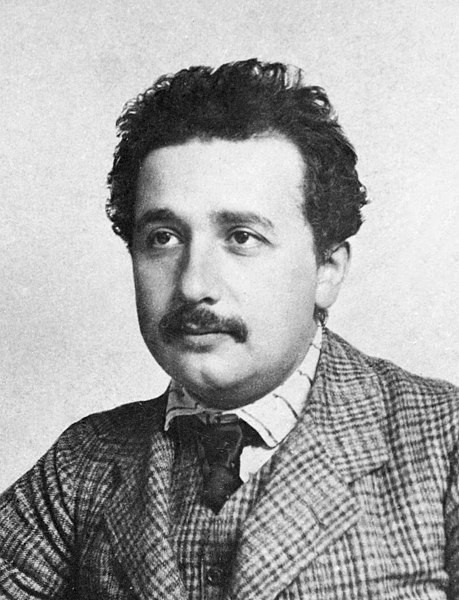 |
There is a romantic image of Albert Einstein as a lonely patent office clerk who from nowhere revolutionised our understanding of the Universe.
While it is true that Einstein’s papers of 1905 were published while he was working at the Swiss Patent Office, he was not an “outsider” and was well qualified in physics. This is all well documented, so I will not examine the details here, rather I will just highlight Einstein’s education and early achievements. |
- 1901 Einstein completed a 4 year mathematics and physics teaching diploma at Zurich Polytechnic. In the same year Einstein published his first paper in Annalen der Physik, which is a good journal. He acquired Swiss citizenship that year and, as he was unable to find a teaching post, he accepted a position as technical assistant in the Swiss Patent Office.
- 1905 Einstein obtained a PhD from the University of Zurich under Alfred Kleiner. This was his “annus mirabilis”, the year in which he published works on the photoelectric effect, Brownian motion, special relativity, and the equivalence of mass and energy which brought him to the wider attention of physicists. Much of this work was done while at the patent office as well as in his spare time.
- 1908 Einstein was appointed lecturer at the University of Bern.
Einstein’s disservice to physics
So we see that Einstein was well qualified in physics by the time he published his best known works in 1905. He has a diploma in mathematics and physics, and had completed his PhD studies. Einstein was an “unknown” in physics in 1905, he only just finished his PhD, but he was by no means an “outsider”.
Einstein’s biggest disservice to physics was not being able to get a teaching job in 1901. Unfortunately, finding jobs is not easy and many good people struggle today, just as they did in Einstein’s time. Anyway, this has lead to the false image of Einstein that many quacks have; “if a simple patent office worker can revolutionise physics, then so can I“.
Link
Albert Einstein – Biographical (Nobel Prize website)
Einstein was a stranger to the four fields he published in during his annus mirabilis. Einstein did have the academic record and publication history to be able to bring his insights to the attention of experts, but that only got him in the door. He had something big and original to say in four different fields, in one year. One paper earned him a Nobel prize (the photoelectric effect).
These were very contemporary subjects that he tackled, just about everyone would have been a stranger in the sense of no or few publications in something similar!
His work was peer reviewed in exactly the same way as anyone’s would have been. The key point of his academic record and publication history is that he knew the issues of the day and knew how to write papers on them. He knew the language and style that was required.
Absolutely, Einstein helped shape modern physics as we know it today. But again, he knew what was required in order to make original contributions and how to present them.